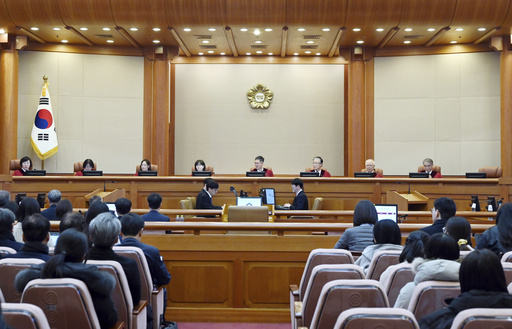SEOUL, South Korea — On Tuesday, the chief aide of impeached President Yoon Suk Yeol made an urgent appeal to law enforcement to reconsider their plans to detain him over the martial law he declared last month. Presidential Chief of Staff Chung Jin-suk suggested that Yoon could be questioned at an alternative location or even at his home rather than facing a police force that he compared to that of a “South American drug cartel.” Chung’s remarks came as authorities were preparing for another attempt to take Yoon into custody.
Lawyer Yoon Kab-keun, who represents the president, indicated that Chung did not consult with their legal team prior to making this plea and emphasized that there are no immediate plans to make Yoon available for questioning. The president has stayed at his official residence in Seoul for several weeks, and previously, on January 3, investigators were thwarted from detaining him after a long standoff that lasted nearly six hours.
The Corruption Investigation Office for High-Ranking Officials and police have committed to increasing their efforts to detain Yoon as they investigate whether his brief declaration of martial law on December 3 constitutes an attempted rebellion. The National Police Agency has held numerous meetings to strategize the operation, and the size of the police presence suggests that over a thousand officers may be deployed in an extensive operation lasting multiple days. The agency has warned that bodyguards who obstruct the execution of the warrant could be arrested.
While the anti-corruption agency and police have not disclosed when they might make another attempt at apprehending Yoon, the chief of staff expressed that he believes “D-day” could be Wednesday, though he did not provide specific sources for this information. Officials from the anti-corruption agency and police met with representatives from the presidential security service earlier to discuss executing the detention warrant, but it remains unclear if any resolution was achieved during their discussions.
Yoon’s decision to impose martial law, which involved placing military personnel around the National Assembly, lasted only for a few hours before lawmakers managed to dissolve the blockade and revoke the measure. His presidential powers were suspended following his impeachment by a majority-opposed assembly on December 14, which accused him of rebellion. The ultimate decision regarding Yoon’s fate lies with the Constitutional Court, which is currently deliberating whether to formally remove him from office or to reject the charges against him, allowing for his reinstatement.
The court recently held its first formal hearing in Yoon’s case, which lasted under five minutes, as Yoon opted not to attend, choosing to remain at his residence while the warrant is still in effect. The next court session is scheduled for Thursday, and proceedings will continue regardless of Yoon’s presence. Concerns have been raised by acting leader, Deputy Prime Minister Choi Sang-mok, regarding the potential for confrontations between authorities and the presidential security service, which maintains that it must protect the impeached president despite the court’s warrant for his detention.
Chung voiced that the anti-corruption agency and police are fully prepared for an operation to incircle him, claiming they are ready to overpower any defenses at a moment’s notice. He accused investigators of seeking to publicly humiliate Yoon and noted that thousands of citizens have been vigilantly gathering outside the presidential residence, promising to defend him. Chung also warned that any violent engagement between law enforcement and citizens could lead to a catastrophic outcome.
Amidst this period of unrest, large crowds of both pro-Yoon and anti-Yoon demonstrators have been congregating outside Yoon’s office in Seoul in anticipation of another attempt to detain him. Yoon’s legal representatives cautioned that if images of him being forcibly taken away in handcuffs were to surface, it could provoke considerable anger among his supporters, potentially leading to widespread civil discord in a nation already fragmented along ideological and generational lines.
During the previous standoff on January 3, Yoon’s bodyguards had the support of military personnel assigned to safeguard the presidential residence. However, on Tuesday, a spokesperson for the Defense Ministry indicated that these troops will refrain from interfering with any attempts to execute the detention warrant and will concentrate solely on securing the boundaries of the compound.

